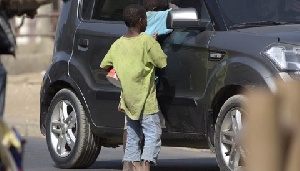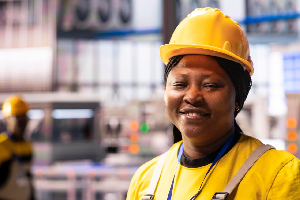In recent times, the streets of Accra have witnessed a troubling phenomenon – the proliferation of child beggars. This surge in child begging, predominantly observed in the age range of 5 to 11 years old, presents a multifaceted challenge to the social fabric of Ghana.
Beyond the immediate implications for these vulnerable children, it casts a shadow on the nation's reputation, especially in the eyes of the numerous tourists who visit our vibrant country.
Originating primarily from neighboring countries such as Chad, Niger, and Nigeria, these children find themselves ensnared in the web of child trafficking, a deplorable practice that robs them of their childhood and basic human rights. Transported across borders under dubious circumstances, they are thrust into the perilous streets of Accra, forced to navigate through bustling traffic, knocking on car windows in a desperate plea for sustenance.
One cannot help but question the apparent inaction of law enforcement agencies, municipal authorities, and other stakeholders entrusted with safeguarding the welfare of these children. Why does this alarming trend persist unabated? Where is the oversight that should shield these innocent souls from exploitation and neglect?
The presence of child beggars not only reflects systemic failures in our societal structures but also underscores the urgent need for concerted action. We must address the root causes of child trafficking and begging, tackling issues such as poverty, lack of education, and inadequate social support systems. This demands a collaborative effort involving government agencies, civil society organizations, international partners, and the community at large.
First and foremost, there must be rigorous enforcement of existing laws aimed at combating child trafficking and exploitation. The police, in conjunction with relevant authorities such as the Accra Metropolitan Assembly (AMA), should intensify their efforts to identify and apprehend traffickers, while also providing support and rehabilitation services to rescued children.
Moreover, proactive measures should be implemented to prevent children from falling prey to traffickers in the first place. This entails targeted interventions such as community outreach programs, awareness campaigns, and economic empowerment initiatives aimed at vulnerable families. By addressing the underlying socio-economic factors that drive child trafficking, we can stem the tide of this harrowing phenomenon.
In addition, education plays a pivotal role in breaking the cycle of poverty and exploitation. Access to quality education equips children with the knowledge and skills they need to build a better future, shielding them from the clutches of traffickers and offering hope for a brighter tomorrow. Thus, investment in education must be prioritized as a fundamental pillar of our response to child begging and trafficking.
Furthermore, collaboration with regional and international partners is crucial in addressing the transnational nature of child trafficking. By fostering cooperation and sharing best practices, we can enhance our collective capacity to combat this grave violation of human rights.
In conclusion, the surge in child begging on the streets of Accra is a stark reminder of the challenges we face as a nation. It is a call to action, compelling us to stand united in defense of the most vulnerable among us.
By addressing the root causes, strengthening enforcement mechanisms, and investing in education and social support systems, we can create a future where every child in Ghana is free from exploitation and able to realize their full potential. Together, let us build a society where the rights and dignity of every child are fiercely protected.
Opinions of Tuesday, 23 April 2024
Columnist: Ralph Campbells















